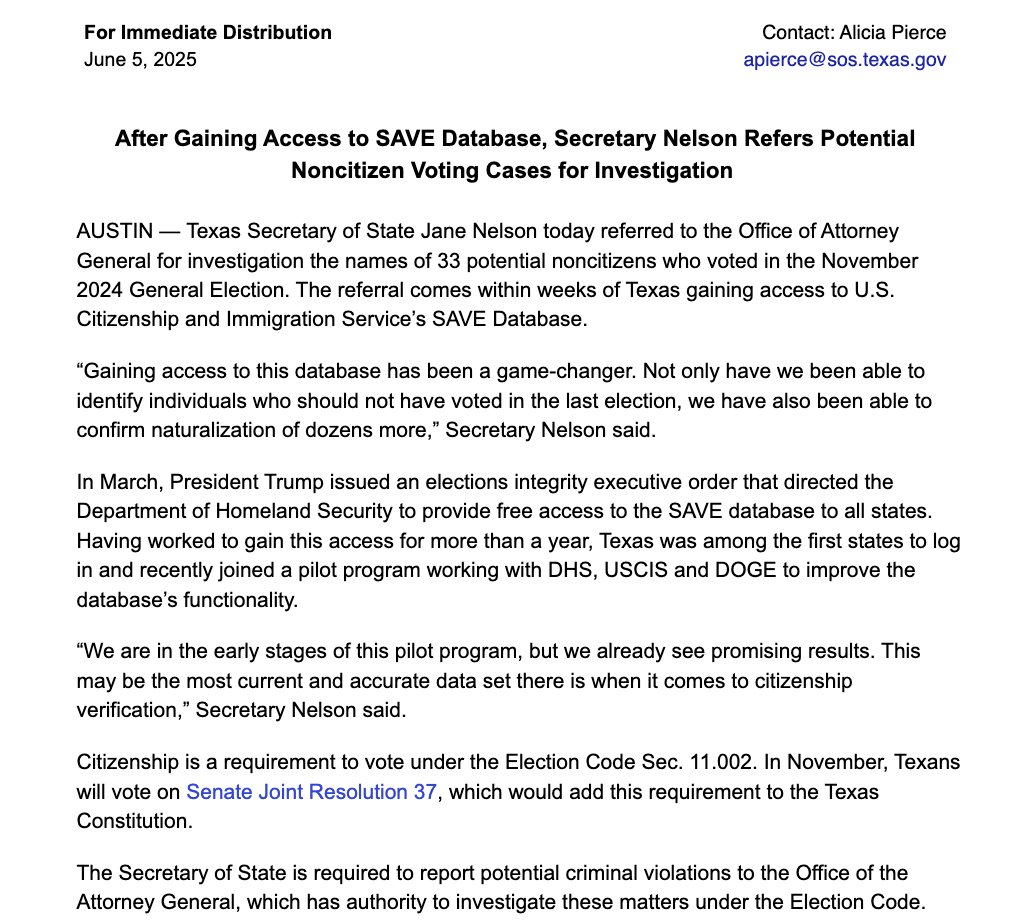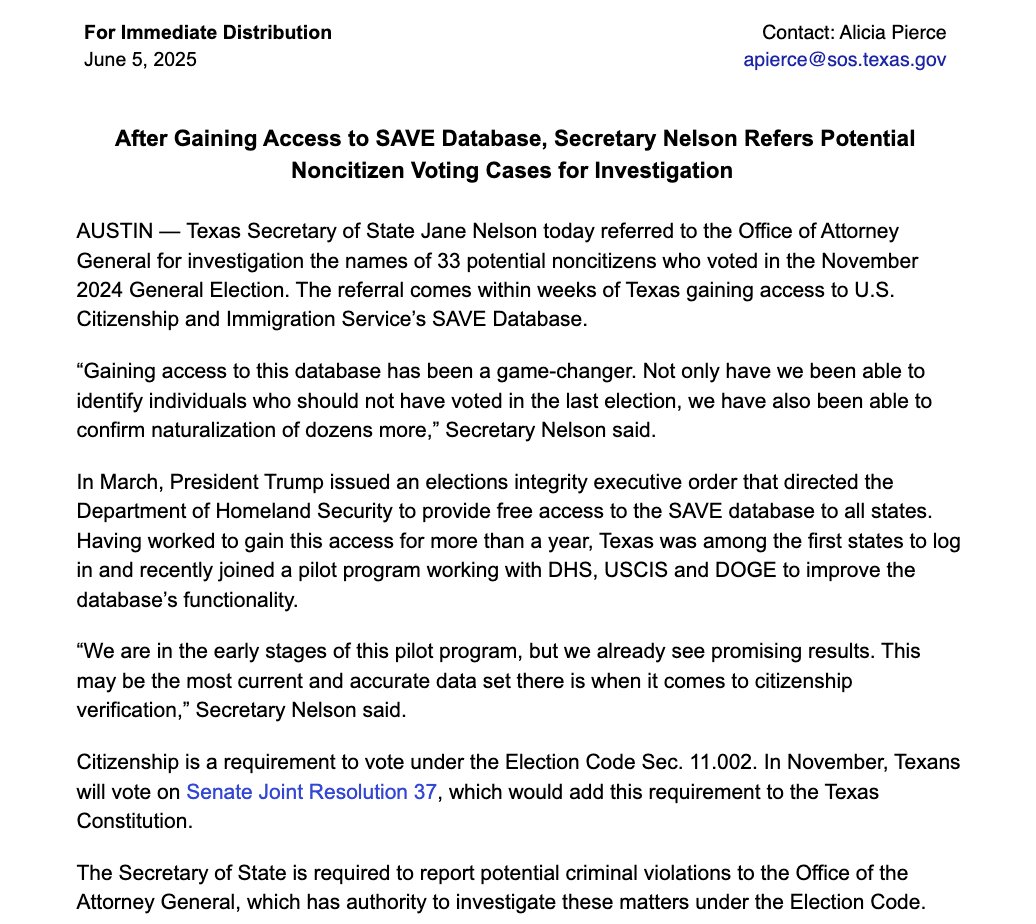Texas Secretary of State Claims Voting Fraud with New Database!
Texas Secretary of state‘s Database Access: A Game-Changer in Voter Integrity
In a significant development within the realm of voter integrity, Texas Secretary of State Jane Nelson has announced the referral of 33 potential noncitizens who allegedly voted in the November 2024 election for further investigation. This move comes after the Secretary of State gained access to the Systematic Alien Verification for Entitlements (SAVE) database, which has been described as a "game-changer" by the office itself. This article delves into the implications of this event, the importance of database access, and the ongoing discussions around voter integrity in Texas.
Understanding the SAVE Database
The SAVE program is a crucial tool utilized by government agencies to verify the immigration status of individuals applying for various public benefits. The Secretary of State’s access to this database allows for a more thorough investigation into the voting records of individuals suspected of voting illegally. By cross-referencing voter registration information with the SAVE database, the Texas Secretary of State can identify noncitizens who may have participated in elections, a concern that has gained traction in various states across the U.S.
The Role of the Texas Secretary of State
The Texas Secretary of State is responsible for overseeing elections in the state, ensuring that they are conducted fairly and transparently. This office plays a pivotal role in maintaining the integrity of the electoral process. With the newfound access to the SAVE database, Secretary of State Jane Nelson is taking proactive measures to uphold this integrity by identifying potential voting irregularities.
The referral of these 33 cases to the Texas Attorney General signifies a commitment to addressing concerns about noncitizen voting. It also highlights the ongoing efforts by state officials to bolster election security and public confidence in the electoral process.
- YOU MAY ALSO LIKE TO WATCH THIS TRENDING STORY ON YOUTUBE. Waverly Hills Hospital's Horror Story: The Most Haunted Room 502
Implications for Voter Integrity
The investigation into potential noncitizen voting is part of a broader conversation about election integrity in Texas and across the nation. Concerns about voter fraud have been a topic of heated debate, with proponents arguing for stricter measures to prevent illegal voting, while opponents claim such measures can disenfranchise eligible voters.
By utilizing the SAVE database, Texas officials are taking a significant step toward addressing these concerns. The ability to investigate potential cases of noncitizen voting can help reassure the public that election integrity is being prioritized. However, it also raises questions about the methods used to verify voter eligibility and how such investigations may impact legitimate voters.
The Political Landscape
The announcement by Secretary Jane Nelson has garnered attention not only for its implications for voter integrity but also for the political environment surrounding it. The Texas Legislature has been actively engaged in discussions about election laws, and this development may influence future legislative actions. As the state grapples with the balance between ensuring fair elections and protecting voter rights, this investigation could become a focal point in political debates.
The hashtag #TXLege, referring to the Texas Legislature, has been used in discussions related to this topic, indicating the significance of legislative involvement in election integrity issues. As lawmakers consider potential reforms or adjustments to existing laws, the findings from these investigations could shape future policies.
Public Reaction and Concerns
The announcement has sparked a range of reactions from the public, advocacy groups, and political commentators. Supporters of the investigation view it as a necessary step to safeguard the electoral process, while critics argue that focusing on noncitizen voting distracts from more pressing issues, such as access to the ballot for eligible voters.
Concerns about the potential for wrongful accusations against legal voters are also prevalent. The use of the SAVE database for voter verification raises questions about accuracy, privacy, and the potential for errors that could lead to eligible voters being unjustly targeted. Striking a balance between rigorous verification and protecting the rights of legitimate voters is crucial in maintaining trust in the electoral system.
Moving Forward: The Future of Voter Integrity in Texas
As the investigation into potential noncitizen voting unfolds, it will be essential for the Texas Secretary of State’s office to communicate transparently with the public. Providing updates on the findings and the processes involved in these investigations will help maintain public confidence in the electoral system.
Moreover, the outcomes of this investigation could influence future legislative actions in Texas. If evidence of noncitizen voting is substantiated, it may lead to calls for stricter voter registration requirements and additional verification methods. Conversely, if the findings do not support claims of widespread noncitizen voting, it could prompt a reevaluation of existing policies and practices regarding voter accessibility.
Conclusion
The Texas Secretary of State’s access to the SAVE database marks a pivotal moment in the ongoing efforts to ensure election integrity. By investigating potential noncitizen voting, Texas officials are taking a proactive approach to address concerns about electoral security. However, it is essential to navigate this complex issue with care, balancing the need for thorough investigations with the protection of eligible voters’ rights.
As discussions around voter integrity continue to evolve, the outcomes of this investigation and its impact on Texas’s political landscape will be closely monitored by stakeholders across the spectrum. The future of voter integrity in Texas will depend on the effectiveness of these investigations, public response, and the legislative measures that follow.

“Gaining access to this database has been a game-changer.” ~@TXSecofState
TEXAS SECRETARY OF STATE @SecJaneNelson refers 33 potential noncitizens who voted in the November 2024 election for investigation by the @TXAG, after gaining access to SAVE data. #TXLege pic.twitter.com/fo2giCcAF1
— Erin Anderson (@TrueTexasTea) June 5, 2025
Gaining Access to this Database Has Been a Game-Changer
In a significant development regarding election integrity in Texas, the Secretary of State, @SecJaneNelson, announced that access to the SAVE database has opened new avenues for identifying potential voter fraud. This access has been described as a “game-changer,” allowing state officials to delve deeper into the voting records of individuals suspected of being noncitizens. This initiative comes in the wake of the November 2024 elections, where @TXSecofState has referred 33 potential noncitizens for investigation by the @TXAG.
TEXAS SECRETARY OF STATE Takes Action
The announcement from the Texas Secretary of State is a pivotal moment for election officials. The ability to access the SAVE (Systematic Alien Verification for Entitlements) database allows them to cross-check voter registrations against federal immigration records. This process aims to ensure that only eligible voters participate in elections, thereby maintaining the integrity of the electoral system. After the November 2024 elections, which saw a significant turnout, the focus is now shifting towards scrutinizing the legitimacy of some voters.
The Importance of Accurate Voter Registration
Accurate voter registration is crucial in any democratic society, and Texas is no exception. The state has faced ongoing challenges regarding voter fraud allegations. By leveraging the SAVE database, officials hope to mitigate these concerns. The investigations into the 33 referred cases represent a proactive measure to uphold election laws, ensuring that every vote cast is legitimate. This proactive stance reflects the broader national conversation about voting rights and election security, which is increasingly coming into focus as we approach future elections.
Understanding the SAVE Database
The SAVE database is a vital tool for verifying an individual’s immigration status. It was initially designed to assist state and local agencies in determining eligibility for public benefits. However, its application has expanded to include verifying the eligibility of voters. By accessing this database, Texas officials are now equipped with the necessary resources to conduct thorough investigations into the voter rolls, which could significantly impact future elections.
Implications for Voter Rights
While the intention behind accessing the SAVE database is to ensure election security, it raises important questions about voter rights. Critics argue that such measures can lead to disenfranchisement, particularly among marginalized communities. The fear is that the investigations could create a chilling effect, discouraging eligible voters from participating in elections due to concerns about their status being questioned. It’s a delicate balance to strike: maintaining the integrity of elections while ensuring that all eligible citizens can exercise their right to vote.
Public Reaction and Political Landscape
The response from the public and political leaders has been mixed. Supporters of the initiative argue that it is a necessary step to protect the electoral process, while opponents view it as an overreach that could lead to unnecessary scrutiny of voters. The Texas Tribune highlighted the divided opinions surrounding this issue, emphasizing the need for a balanced approach that considers both security and accessibility in voting.
Future of Election Security in Texas
As Texas moves forward with the investigations of the 33 potential noncitizens, the broader implications for election security will continue to unfold. With ongoing debates about voting laws and access to the ballot box, the state will need to navigate these waters carefully. The lessons learned from this initiative could set precedents for how other states approach voter verification and election integrity moving forward.
The Role of Technology in Modern Elections
Technology is playing an increasingly prominent role in the electoral process. From online voter registration to electronic voting machines, the integration of tech in elections offers both opportunities and challenges. The access to the SAVE database is just one example of how technology can aid in verifying voter eligibility. However, it also underscores the importance of ensuring that these technologies are used responsibly and ethically, without infringing on individual rights.
Conclusion: A New Era for Voting Integrity
As we reflect on the implications of gaining access to the SAVE database, it becomes clear that we are entering a new era for voting integrity in Texas. The proactive stance taken by the Secretary of State’s office could serve as a model for other states grappling with similar issues. However, it is essential to approach these developments with a commitment to safeguarding the rights of all voters while ensuring that elections remain fair and transparent. The journey ahead will undoubtedly be complex, but it is a necessary one to uphold the principles of democracy.
As this situation continues to evolve, staying informed and engaged is vital for all Texans. The integrity of our elections depends on the collective efforts of officials, voters, and advocates alike to ensure that every voice is heard and respected in the democratic process.

